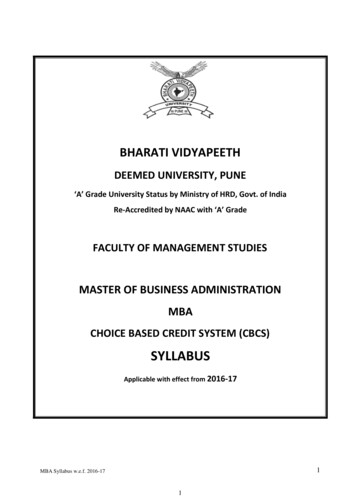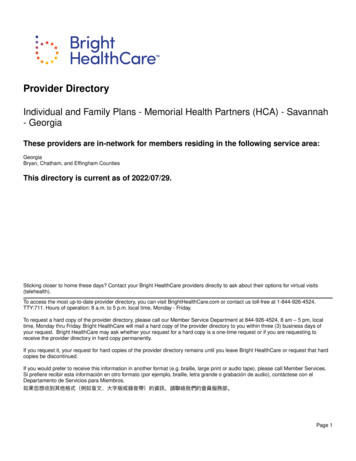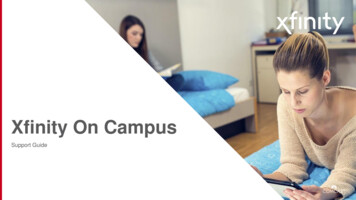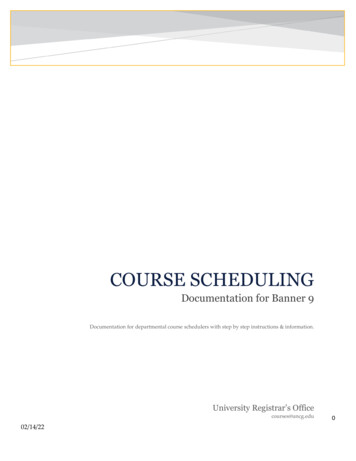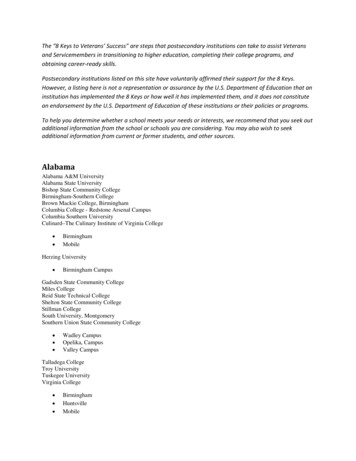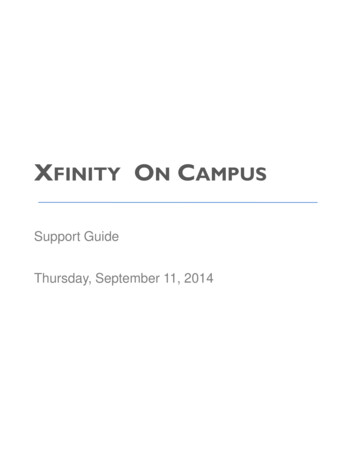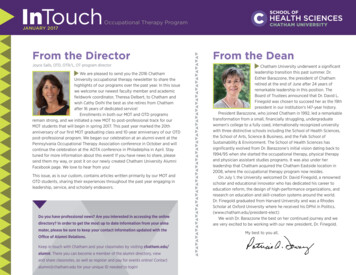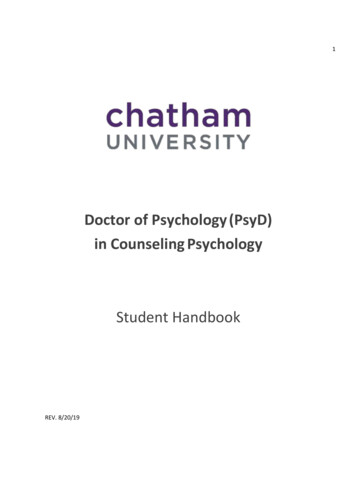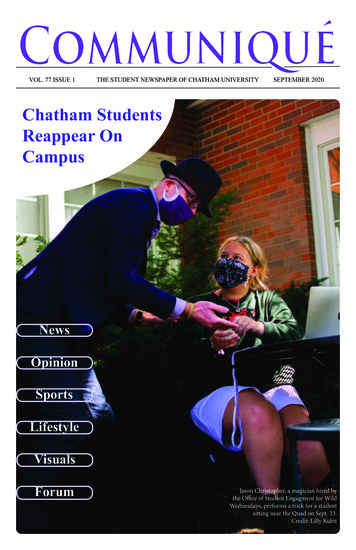
Transcription
VOL. 77 ISSUE 1THE STUDENT NEWSPAPER OF CHATHAM UNIVERSITYSEPTEMBER 2020Chatham StudentsReappear n Christopher, a magician hired bythe Office of Student Engagment for WildWednesdays, performs a trick for a studentsitting near the Quad on Sept. 23.Credit: Lilly Kubit
EDITOR’S NOTEStaff ListEditor-in-chiefAlice CrowDear Chatham Community,The Communiqué, like most things this year, has molded itself to the circumstances we now face. As thestories in this issue will show, Chatham looks quite different this semester, and so does its student newspaper.Due to concerns over public health and safety, the Communiqué decided to focus on its online presence andpublish a monthly e-edition of curated stories in the style of a news magazine.While the format may be new, and somewhat strange for those familiar with the Communiqué’s previouswork, there is something fundamental that remains unchanged about Chatham’s student newspaper: the staff’scommitment to student journalism. During this global pandemic, and as our society shifts in many other monumentous ways, the need for independent student news is unwavering.Even though the way we all interact has changed, our goal to provide critical news and promote discoursehas not. And with that said, please enjoy Volume 77, Issue 1 of the Communiqué.Sincerely,Alice CrowEditor-in-Chief3 RETURN TO CAMPUSA back-to-school timeline of important administrative updates.By Alice Crow5 NEW TITLE IX RULESNew rules from the departmentof education are changing howstudents can report sexual misconduct.By Jorie Meil5 BLM & FIRST-YEARSSome of Chatham’s youngest students are getting involved with theBlack Lives Matter movement.By Jake LachDigital and social media editorJennie PiotrzkowskiNews editorGena CarterSports editorHaley DaughertyOPINION6 COVID ACCOUNTABILITYAn immunocompromised studentspeaks about the responsibilitystudents and faculty have to eachother.By Abbey SullivanSPORTS8 CHANGES FOR ATHLETESDue to COVID-19, it has becomea weird world for student players. What will happen this sportsseason?By Haley Daugherty7 GUEST OP-ED: DIVERSITYA guest writer from Chatham’sBSU speaks on her experience asa Black student at a predominatlywhite university.By Kayla BraceyLifestyle editorWyatt CoryContributing writersMichaela DeLauterJuliana FreemanJake LachJorie MeilJL SilvermanMaggie SusaRyan ThatcherArtistAlexis TarantoPhotographerLilly KubitLIFESTYLEVISUALSFORUM9 NEW FALK SCHOOL DEANLou Leonard is the new dean forthe Falk School of Sustainability &Environment, and he has an extensive past of climate activism.By Gena Carter11 BEFORE & AFTER COVIDA photo series shows the wildlydifferent experiences that Chathamstudents are having this year, ascompared to events on campus inprevious years.By Lilly Kubit12 DOODLEBUGA new comic series about the trialsand tribulations of Doodlebug.By Alexis Taranto10 CLUBS ADAPT TO COVIDChatham’s clubs have found newways to adjust to social distancingand other COVID-19 guidelines.By Michaela DeLauterFaculty advisorSara BauknechtOpinion editorAbbey SullivanCONTENTSNEWSBusiness managerRylee Napolitan
SEPTEMBER 2020NEWSPAGE 3RETURN TO CAMPUSBack-to-school timeline includes plans fortemperature checks, online classes and mask mandatesthe Green Phase plan outlined here,the initial fall 2020 Operating PlanIn the months after the end ofdeveloped from the ongoing effortsthe 2020 spring semester, it wasof the Working Groups is beingunclear what Chatham Univershared with the Board of Trusteessity students could expect whenthis week. Following the Board’sthey returned to campus in the fallfeedback, the plan will be sharedbecause of safety concerns and rewith the campus community thestrictions prompted by COVID-19. week of June 8 for review andIn a series of informationalfeedback.”emails, Chatham administrationJune 12laid out its plans for a return toPresident Finegold sent an emailcampus, which prompted manytitled “Return to Campus for Fallstudent reactions. This is an ac2020.” The message explained thecount of some of those mostreasoning behind the return to campressing updates from Universitypus and the results of the Universipersonnel.ty’s task forces.May 4President Finegold argued therePresident Dr. David Finegoldis a “value of being physicallysent an email, informing studentspresent on campus.” He went onabout what to expect during the fall to write that, due to the increase2020 semester. He expressed thatin knowledge about the virus andthe Chatham experience has always how to mitigate it, Chatham wasbeen about “coming together.” Hecommitted to reopening its campusalso said the Chatham administrathis fall.tion was intent on looking into how“Since April, a series ofoperating on campus could workcross-campus working groups havewith “enhanced social distancingbeen working on scenarios, considguidelines.”erations and plans for operationsThis was the first time studentsin the fall,” President Finegoldwere told about an assemblage ofwrote. He explained that ChathamUniversity Task Forces. Their jobconsulted a variety of public healthwas to plan for different possibiland healthcare resources to informities of a return to campus. Presithe decisions of the various workdent Finegold ended the email bying groups. Some of these sourcespromising the task forces wouldincluded UPMC, the U.S. Centersfinalize and share their plans forfor Disease Control (CDC) andcampus operations by early June.Pennsylvania’s Department ofJune 4Health.An email from Dr. HeatherBlack, Dean of Students, focusedon Allegheny County’s transitionto the “Green Phase,” the least restrictive phase in Gov. Tom Wolf’stiered COVID-19 shutdown plan.Dean Black wrote, “I am happy toshare that Chatham is beginninga phased plan to open offices andface-to-face operations in the coming weeks as Allegheny Countytransitions to the Green Phase.”She forwarded an email PresidentThe results of this work can beFinegold sent to faculty and staff.viewed on the University’s new fallIt explained the dates for which2020 website. President Finegoldselect departments would return to invited the campus communitywork on campus and what all cam- to leave questions and feedback.pus community members shouldHe noted that the website wouldexpect upon their return.be updated weekly and signed off“All employees and studentswith a message of solidarity.reporting to campus will be reThis information was followedquired to receive daily temperature up by an email from Walter Fowler,checks, engage in physical distanc- Senior Vice President of Financesing, wear masks and follow otherand Administration, about a limitedChatham, CDC and PDH guidereopening of Chatham’s campus,lines,” he wrote.starting on June 15.President Finegold finished theA corrections email was thenemail by writing, “In addition tosent. It explained that all build-By Alice CrowThe Campbell Memorial Chapel is one of the sites for temperature checkson the Shadyside campus during the fall semester. Credit: Alice Crowings on Chatham’s campus wouldreopen, except the Athletic andFitness Center and Jennie KingMellon Library, which would openat the end of the month and in July,respectively.July 22Dean Black introduced the Cougars Care commitment, which wasto be completed by Aug. 7. DeanBlack wrote in the email to students, “Cougars Care is an initiative to provide support, resources,videos and training for our ongoingcollective effort toward a safe andsuccessful fall term. It will take allto request academic adjustmentsfor the fall 2020 term. In order torequest adjustments, medical documentation will be necessary.”Academic Affairs further explained that, even with adjustments, not all classes would beprovided virtually and may not bepossible for cohort programs orspecific sequential classes.All documentation for an academic adjustment was due Aug.14 and for review by a committeecoordinated by the Office of Academic & Accessibility Resources(OAAR). The committee’s decisionwould be told to students by emailand all decisions would be final.July 28A petition on Change.org wascreated by Audrey Bodenlos ‘22and Emer Straw ‘21. The petitionwas titled “Chatham UniversityFall 2020, Virtual Class Option.”It was created in response to theemail from Academic Affairs theprevious day, and stated, “ChathamUniversity must allow any studentthe option to attend classes virtualof us, caring for one another andly no matter the reason during thedoing our part, to keep our commu- COVID-19 pandemic.”nity healthy.”Straw also noted in the petitionJuly 27that “forcing students to returnAcademic Affairs sent an emailto in-person classes unless theywith high importance. Addressed to have a medical condition they canstudents, it spoke about the require- prove creates a dangerous situaments to make academic changestion on campus and doesn’t followfor students with health conditions. the precedent being set by otherAcademic Affairs wrote, “Inschools such as CMU and the Unisupport of individuals with medical versity of Pittsburgh. Not allowingconditions who feel that attendingstudents to choose whether to rein-person classes may exacerbateturn in person or not puts students,those conditions, Chatham Univer- faculty, family and the wholesity is providing the opportunityPittsburgh community at greater“ It will take all of us, caring for oneanother and doing our part, to keep ourcommunity healthy.”-- Dr. Heather BlackDean of Student Affairs
SEPTEMBER 2020risk of illness and death as casesof COVID-19 in the city continueto rise. There is no humane reasonfor not giving students the optionof virtual classes to protect boththemselves and the community.”The petition received 428 signatures and was signed by both students and some faculty members.When asked about this initiative,Bodenlos said, “This petition wascreated by a couple of randomstudents who just felt passionately about this. Chatham is a smallschool and it’s relatively easy toget into contact with the right people to at least try to make change.If you want something done, thefirst step to do is try.”Straw added, “We created thepetition because Chatham was notbeing clear at all about what theirplans for the fall semester were andwe felt students deserved a choiceabout how they attend their classesduring a deadly pandemic. No oneshould be forced to risk their life orhealth to get an education.”July 29President Finegold released amessage that another update to the“Fall Plan” would be sent to students Aug. 4. It would address theconcerns raised by the petition.This update would include“changes to the fall course schedule and instructions on findingwhich courses will be available invarying delivery formats, includingvirtual and online options for thosestudents who do not feel comfortable returning to campus this fallfor non-medical personal reasons.”President Finegold wrote, “Werealize that it was not clear fromthat email that additional information on available options for thosewith other personal reasons for notcoming to campus would be forthcoming, and sincerely apologizefor any confusion the email mayhave caused.”Aug. 4Academic Affairs sent a follow-up email about the course delivery options for students duringfall 2020. It explained that it wouldnot be possible to provide everyclass in a virtual or online format.Ultimately, it would be the decisionof the course professor to decidethe delivery format of the course.Academic Affairs wrote, “Ifa student is registered for classroom-based courses and does notfeel comfortable attending classin-person, they should search thecourse schedule for courses listedas an online or virtual format.”It was advised that students workwith their academic advisers tofind course equivalents and substitute courses as needed, but ifstudents could not find an alterna-NEWStive course, they should submit arequest form to their adviser, department chair or program directorto adjust their fall schedule. Theofficial add/drop period would nowend Sept. 1.In response to Chatham’s decision, outlined in the Aug. 4Academic Affairs email, Boden-Aug. 14Parkhurst Dining informed students via email on what they couldexpect when eating on campus.While a dining option would stillbe provided, there would be limited seating.Robust take-out options would beavailable to compensate.Masked students relax Sept. 16 on the Quad at Chatham University’sShadyside campus. Credit: Lilly Kubitlos commented, “I think it’s alsoimportant to notice that Chatham never truly gave students aschool-sanctioned virtual option.This is still something that youhave to work out with each professor on an individual basis. I understand that it may not be possibleto make everyone be virtual however, I believe that Chathamadministration should have enforced all professors to come upwith a completely virtual option forevery single class.”Aug. 5In an email, Dean Black asked allstudents to self-isolate at home for14 days before arriving on campus.She discouraged “goodbye gatherings” and encouraged students tolimit their exposure to people.If students couldn’t isolate for the14-day period, they were asked tofollow health guidelines and “observe all the behaviors that are partof the Cougars Care Commitmentwhen working and avoid any otheractivities outside your home.”Aug. 11Dean Black requested all students to update their personalinformation on the student portalby Aug. 23. This would aid contact tracers when needing to getin contact with those exposed toCOVID-19.“As part of our efforts to protectagainst the spread of COVID-19,”Dean Black explained, “Chathamhas trained a team of staff membersto act as contact tracers in the eventwe have a positive case on campus.Contact tracing is a process usedto contact all individuals who havebeen within a 6-foot radius formore than 15 minutes of the positive case.”“There will also be satellite stations [Monday through Friday]for lunch at various areas on theShadyside campus. We also havean enhanced disinfecting program,as well as, Safety Ambassadors onour teams,” Parkhurst reassuredstudents in the email.A list of places students coulduse their meal plan was provided atthe bottom of the email.Aug. 19Chatham University Communications informed students towhen they would and would not berequired to wear a mask while oncampus. Based upon the list in theemail, masks would be requiredeverywhere, except when alone inclosed spaces and outside, if possible, to maintain social distancing.“Chatham will provide all students and employees with masks tosupplement any masks they alreadyuse. If anyone forgets their mask,or it becomes damaged, they canpick up a replacement at the Officeof Student Affairs, too,” accordingto the email.Aug. 20Dean Black sent an email labeledas high importance to all students.In it, she wrote, “This week, theCounty had reports of collegeparties in Pittsburgh, and discussedwith all of the local colleges theimportance of our students following health and safety guidelines toavoid a repeat of what happened inJune and July.”Dean Black warned that “ifparties and flouting of health andsafety guidelines continue to occur,the county or city could well takesteps that will greatly impact andlimit your experience this academic term!”PAGE 4She reminded that actions, likegathering without social distancing, are against the honor code.Aug. 21Dean Black provided studentswith information on how to receivea COVID-19 test. Students withsymptoms, or informed by contacttracers that they may have been exposed, must get a test on campus.To receive testing, students weretold to first make an appointmentwith Student Health Services.At the time of their appointment,they should report to the two tentsbehind Woodland Hall. A studentshould know the test results inabout 15 minutes after the test.Fall 2020 semester beginsSince the beginning of the fallsemester, the majority of updatesabout COVID-19, and Chatham’splans to combat it, have beenprovided from the Cougars Carecommunity emails that are sent toall students on Fridays. Most recently, on Sept. 11, the communityupdate included information aboutChatham’s first positive case.A link to the website furtherexplained that “Chatham wasinformed [Sept. 10] (throughself-reporting) by a member of thecampus community that they testedpositive for COVID-19. The lasttime this community member wason campus was Friday, Sept. 4, andthe community member is currently isolating at home off campus.”Previously laid out protocols ofcontact tracing and testing werebeing followed. Weekly community updates will continue to informstudents of Chatham University’splan to combat COVID-19.Sept. 3 at 11 a.m. - Harassmentat Eden Hall campus.Sept. 4 at 4:55 a.m. - Medicalassistance at Laughlin House.Sept. 4 at 10:40 a.m. - Medicalassistance at Jennie King MellonLibrary.Sept. 4 at 11:32 a.m. - Firealarm at Chatham’s Eastsidecampus.Sept. 7 at 5 p.m. - Smell of gasin the Athletic and Fitness Center.Sept. 8 at 12:45 p.m. - Trafficdispute at Howe-Childs GateHouse.Sept. 17 at 6:30 p.m. - Medicalassistance at Hicks Estate.
SEPTEMBER 2020NEWSPAGE 5New federal regulations change Chatham Title IX policiesBy Jorie MeilFederal changes made by theU.S. Department of Education toTitle IX regulations are being implemented at Chatham University.The new regulations, known asthe “Final Rule,” offer proceduralchanges and increased protectionsof all parties involved in sexual harassment investigations. Chathambegan operating under these newpolicies Aug. 14, as required by theDepartment of Education.The regulations change the definition of the umbrella term “sexualharassment” used in the Title IXpolicies. Sexual harassment is described in three ways by the FinalRule:1. “Quid Pro Quo” -- An employee of a school conditioning the provision of an aid, benefit or serviceof the school on an individual’sparticipation in unwelcome sexualconduct2. Unwelcome conduct determined by a reasonable person tobe so severe, pervasive and objectively offensive that it effectivelydenies a person equal access tothe school’s education program oractivity3. Sexual Assault, Dating Violence, Domestic Violence orStalking (as defined in the Policy).Chatham Title IX coordinatorSean Coleman said the changesto the second definition of sexualharassment (listed above) are, “oneof the first differences if you lookat our policy this year.”This definition of sexual harassment is narrower than what wasused by Chatham and many otherschools prior to the Final Rule. Under former Title IX policies, acts ofone “decision maker.” The decisionmaker presides over the hearingand determines sanctions if necessary to the specific case.During the hearings, both parties,the complainant and respondent,are subject to cross examinationThe process after reporting an incident to Title IX under the new federalregulations. Credit: Alexis Tarantosexual misconduct were referred toas “prohibited acts.”These descriptions of sexualharassment limit Title IX’s jurisdiction to reports that fall directlyinto one of these definitions.Chatham is now required tohold hearings regarding allegedsexual harassment. Prior to thenew policies, Chatham used atwo-investigator model to conductinvestigations. Under the changes,there is now one investigator andby an adviser. This adviser couldbe appointed by the University,or hired by the respective party.Advisers are responsible for askingquestions provided by the party they are representing. This isdone so there is no direct contactbetween the respondent and complainant during the hearing.Critics of the Final Rule assertthat its new regulations may makea complainant apprehensive to disclose an incident of sexual harass-ment to Title IX.“There is something to be saidabout live hearings, that they areparticularly traumatic for victimsbecause survivors often suffer fromPTSD,” said Blue Strickland, aChatham student and sexual healthadvocate.Coordinator Coleman said heunderstands how a hearing couldbe daunting. He hopes that the newTitle IX regulations “don’t inhibitor discourage anyone at Chathamfrom reporting that they’ve experienced sexual harassment, includingsexual assault. Because if Chathamdoesn’t know that a person hasbeen sexually harassed, we can’thelp that person, can’t help stop thesexual harassment and can’t helpstop the harassment from happening again.“The new regs leave the choiceof pursuing a formal complaint,which initiates an investigation anda hearing in almost every circumstance [but] a complainantcan still report sexual harassmentand receive supportive measureseven if they don’t choose or choseto file a formal complaint.”Anyone who wishes to report anincident of sexual harassment cancontact the Chatham Title IX officefor resources and aid. The ChathamTitle IX office is located on thesecond floor of Mellon Center, andpersonnel can be reached via phoneor email, all of which are listed onthe Chatham Title IX website.First-year students stand up for Black Lives Matter movementBy Jake LachChatham University students arefighting for diversity and inclusionthrough the Black Lives Mattermovement.Although many first-year students are still adapting to collegelife, they also are speaking out andtaking a stance on issues of racialinequity.Protests in support of BLM haveexpanded rapidly in recent years inmany cities. The movement began in 2013 in response to policeofficer George Zimmerman beingacquitted from the charges relatedto fatally shooting Trayvon Martin,a 17-year-old Black high schoolstudent.Since then, the BLM movementhas continued to highlight theinequalities in the U.S. justice system and systemic racism.“Regarding diversity [at Chatham],” Aaliyah Thomas, class of‘24 president, said, “I really wantto start getting the conversationstarted.” She believes it may behard for some to communicatetheir ideas. “We want it to be anenvironment of inclusivity, butalso a comfortable conversation foreverybody.”Thomas has first-hand experience attending BLM protests. Shebelieves that the protests aren’talways depicted accurately bymainstream media, which causes alot of people to be too scared to goout and show support.“I didn’t feel in danger. . I feellike the media specifically is quickto show a violent protest versus anon-violent protest,” Thomas said.Black Lives Matter is very personal to Thomas. As a Black individual raised by white parents, shehas experienced racist commentsand stereotypes.“It’s a hard thing to go through,”she said, “and even harder to bestereotyped.”Thomas has struggled to understand her identity throughout herlife. Growing up with both parentsbeing white and Republican, shehas experienced many hardships.“Mostly real-life accounts like .being called the n-word downtownbecause I looked at a guy too manytimes,” Thomas explained. “Youknow, not understanding that andmy mom telling me ‘well, you’renot the n-word, Aaliyah -- you’rewhite,’ and it not making sense.”Thomas has also pursued activism through storytelling. Twoof her pieces, “Said” and “Loveisn’t skin color,” were recognizedby Carnegie Mellon University inits annual Martin Luther King Jr.Writing Awards.“This issue [of injustice] is notjust going to disappear,” Thomas said. “It’s not going to just goaway. It’s going to persist untilpeople start listening.”Protests aren’t the only way tocontribute to the movement. LilySlagle ‘24 has found ways to showher support from home.“I have signed a ton of petitionsand advocated for Black lives onsocial media,” Slagle said.Online there are various bail andrelief funds that can be donatedto and petitions to sign, as well asmore information on the movementfor those who are interested.“There aren’t enough peopletaking action within this movementyet. My advice for those afraidof joining the movement is to letgo of that fear,” Slagle said. “Youcan be the change that needs to beseen.”There are many events scheduledacross Pittsburgh during the nextmonth. On Oct. 9-11, SisTer’s PGHis hosting an online event to standup for transgender Black lives.Details on other protests and eventscan be found at burghprotests.com.Students at a recent BLM protest indowntown Pittsburgh.Credit: Aaliyah Thomas
SEPTEMBER 2020OPINIONPAGE 6Chatham’s immunocompromised struggle with student accountabilityI am fearful for Judge Stickman’sproposed “return to normal” as ISince March 2020, COVID-19feel that my health would inevihas rendered our day-to-day livestably suffer. As a college student,forever changed. Our cultureI also feel that non-immunocomis different now and, while thispromised people often are notdifference proves more and morereciprocating nor understandingexhausting each week we spend inmy efforts in an attempt to preempquarantine, there has been a newtively return to what life was likesurge in efforts to lift COVID-19before the pandemic.restrictions both informally andChatham University especiallylegislatively.needs to confront our collectiveAs of Sept. 14, WHTM-TV Pittsattitude of bending the rules due toburgh reported that “Butler, Green,our unique circumstances. Due toFayette and Washington [counties]our small size, there is an assumppreviously filed a lawsuit claimingtion by some that we are at a lowerthat [Gov. Tom] Wolf’s closingrisk for contracting the virus. Theof non-life-sustaining businessessupposition follows that comparedand other restrictions during theto the University of Pittsburgh orCOVID-19 pandemic were unconCarnegie Mellon University, westitutional” and that federal Judgehouse fewer students and, thereWilliam Stickman, a Trump apfore, not as many chances forpointee, ruled in their favor.contamination.Should Gov. Wolf’s appeal fail,This attitude is evident in somethis ruling means that businessespeople’s passivity toward wearingsuch as hair salons, movie theatersmasks. Frequently, students can beand other nonessential establishseen traveling across the Shadysidements would reopen at full capaccampus with their masks tuckedity, potentially causing anotherunderneath their chin or proppedsurge in COVID-19 cases.below their nose, which renders theJudge Stickman argues thatgarment ineffective. Additionally,the population of Pennsylvaniasocial media is often plastered with“cannot accept the new normal”inside looks into gatherings thatunder the U.S. Constitution, yetseem to forget social distancing.he doesn’t seem to understandThus, this line of thinking is bothwhat this new normal is aimed toselfish and ignorant. It doesn’t acachieve. Throughout the discussioncount for the students, faculty andabout the reopening of states, oneadministrators who engage in thesubset of people is often overChatham community each day aslooked: the immunocompromised.immunocompromised people.The National Cancer Institute deSome students’ nonchalancefines being immunocompromisedregarding COVID-19 on campusas “having a weakened immuneis enforced by Chatham’s pastsystem [and] a reduced ability toand current policy decisions aboutfight infections and other diseassocial distancing and virus transes.” This state can arise via certainmission. Chatham denied studentsmedications and treatments, as wellthe guaranteed option for all virtualas autoimmune disorders, includor online courses without medicaling diabetes and arthritis.documentation that would subseBeing immunocompromised isquently be sent to Office of Acaconcerning enough without thedemic & Accessibility Resourcesonset of COVID-19. Yet, combinedfor approval. This policy ignoreswith the pandemic, people whostudents who may come in contactfall into this group are forced towith peers who are immunocommake even more inconvenient andpromised either at school, work orconsequential choices for the saketheir home environment.of their health. Their social interacWith this decision, Chathamtions are even further limited, andpotentially opened the door for antheir employment options are moreincreased number of asymptomaticharshly regulated (if not abandonedcarriers to enter our community.in fear of infection). Then there areAdditionally, on Sept. 21 Resgroups of people like me, studentsidence Life issued a survey viawhose environment demandedemail to all students living on cammass alterations.pus asking about the current guestI’m an immunocompromisedpolicy. As the policy currentlyperson due to a rare autoimmunestands, only residents living in thedisorder I’ve lived with since thesame building may visit one anothearly 2000s. I understand the preer. The survey, however, addressedcautions I must take to stay safe. Ia potential change that would allowsacrificed a socially and financiallyfor residents of other campus houslucrative summer for my well being locations to intermingle.ing and the well being of others.This change could possibly be di-By Abbey SullivanBy Abbey SullivanSigns around campus remind students, faculty and staff to be mindful oftheir health and the well being of others. Credit: Abbey Sullivansastrous, not only for immunocompromised folks residing in on-campus housing, as we rely on thisstrict policy for guaranteed safety,but also for the entire student bodyas contact tracing measures wouldonly grow more difficult due toincreased inter-housing traffic.Chatham University is in aunique situation following theonset of COVID-19. The circumstances of our campus and studentbody are different when comparedto neighboring schools. However,giving in to students’ displeasureregarding strict social policies onlyfurthers a culture of passivity andlenience, which in turn neglectsChatham’s most vulnerable groups.The school and its studentsshould remember that the less seriously we take COVID-19 and itsaccompanying struggles, the longerit’s here to stay.
SEPTEMBER 2020In an open letter to President Dr.David Finegold and Chatham University’s administration, the BlackStudent Union and other Black,Brown and Indigenous People ofColor (BIPOC) expressed theirgrievances with the University’spoor response to the racial violencethat’s made Chatham in their viewsan undesirable environment.They also voiced their demandsfor how
VOL. 77 ISSUE 1 THE STUDENT NEWSPAPER OF CHATHAM UNIVERSITY SEPTEMBER 2020 Jason Christopher, a magician hired by the Office of Student Engagment for Wild Wednesdays, performs a trick for a student sitting near the Quad on Sept. 23. Credit: Lilly Kubit News Sports Opinion Lifestyle Visuals Forum Chatham Students Reappear On Campus
